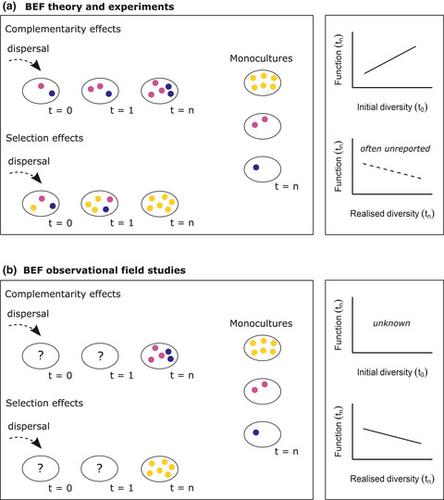当前位置:
X-MOL 学术
›
Ecol. Lett.
›
论文详情
Our official English website, www.x-mol.net, welcomes your feedback! (Note: you will need to create a separate account there.)
We should not necessarily expect positive relationships between biodiversity and ecosystem functioning in observational field data
Ecology Letters ( IF 8.8 ) Pub Date : 2021-09-16 , DOI: 10.1111/ele.13874 James G Hagan 1, 2 , Bram Vanschoenwinkel 3, 4 , Lars Gamfeldt 1, 2, 5
Ecology Letters ( IF 8.8 ) Pub Date : 2021-09-16 , DOI: 10.1111/ele.13874 James G Hagan 1, 2 , Bram Vanschoenwinkel 3, 4 , Lars Gamfeldt 1, 2, 5
Affiliation

|
Our current, empirical understanding of the relationship between biodiversity and ecosystem function is based on two information sources. First, controlled experiments which show generally positive relationships. Second, observational field data which show variable relationships. This latter source coupled with a lack of observed declines in local biodiversity has led to the argument that biodiversity-ecosystem functioning relationships may be uninformative for conservation and management. We review ecological theory and re-analyse several biodiversity datasets to argue that ecosystem function correlations with local diversity in observational field data are often difficult to interpret in the context of biodiversity-ecosystem function research. This occurs because biotic interactions filter species during community assembly which means that there can be a high biodiversity effect on functioning even with low observed local diversity. Our review indicates that we should not necessarily expect any specific relationship between local biodiversity and ecosystem function in observational field data. Rather, linking predictions from biodiversity-ecosystem function theory and experiments to observational field data requires considering the pool of species available during colonisation: the local species pool. We suggest that, even without local biodiversity declines, biodiversity loss at regional scales—which determines local species pools—may still negatively affect ecosystem functioning.
中文翻译:

我们不一定期望在观测现场数据中生物多样性与生态系统功能之间存在正相关关系
我们目前对生物多样性和生态系统功能之间关系的实证理解基于两个信息来源。首先,对照实验显示总体上呈正相关。第二,显示变量关系的观测场数据。后一种来源加上未观察到当地生物多样性下降的现象导致生物多样性-生态系统功能关系可能无法为保护和管理提供信息的论点。我们回顾了生态理论并重新分析了几个生物多样性数据集,以论证生态系统功能与观测现场数据中的局部多样性的相关性在生物多样性-生态系统功能研究的背景下通常难以解释。发生这种情况是因为生物相互作用在群落组装过程中过滤了物种,这意味着即使在观察到的局部多样性较低的情况下,生物多样性也会对功能产生很大的影响。我们的审查表明,在实地观测数据中,我们不一定期望当地生物多样性与生态系统功能之间存在任何特定关系。相反,将生物多样性生态系统功能理论和实验的预测与实地观察数据联系起来,需要考虑殖民期间可用的物种库:当地物种库。我们认为,即使当地生物多样性没有下降,区域尺度的生物多样性丧失——决定了当地物种库——仍然可能对生态系统功能产生负面影响。我们的审查表明,在实地观测数据中,我们不一定期望当地生物多样性与生态系统功能之间存在任何特定关系。相反,将生物多样性生态系统功能理论和实验的预测与实地观察数据联系起来,需要考虑殖民期间可用的物种库:当地物种库。我们认为,即使当地生物多样性没有下降,区域尺度的生物多样性丧失——决定了当地物种库——仍然可能对生态系统功能产生负面影响。我们的审查表明,在实地观测数据中,我们不一定期望当地生物多样性与生态系统功能之间存在任何特定关系。相反,将生物多样性生态系统功能理论和实验的预测与实地观察数据联系起来,需要考虑殖民期间可用的物种库:当地物种库。我们认为,即使当地生物多样性没有下降,区域尺度的生物多样性丧失——决定了当地物种库——仍然可能对生态系统功能产生负面影响。将生物多样性生态系统功能理论和实验的预测与实地观察数据联系起来,需要考虑殖民期间可用的物种库:当地物种库。我们认为,即使当地生物多样性没有下降,区域尺度的生物多样性丧失——决定了当地物种库——仍然可能对生态系统功能产生负面影响。将生物多样性生态系统功能理论和实验的预测与实地观察数据联系起来,需要考虑殖民期间可用的物种库:当地物种库。我们认为,即使当地生物多样性没有下降,区域尺度的生物多样性丧失——决定了当地物种库——仍然可能对生态系统功能产生负面影响。
更新日期:2021-11-11
中文翻译:

我们不一定期望在观测现场数据中生物多样性与生态系统功能之间存在正相关关系
我们目前对生物多样性和生态系统功能之间关系的实证理解基于两个信息来源。首先,对照实验显示总体上呈正相关。第二,显示变量关系的观测场数据。后一种来源加上未观察到当地生物多样性下降的现象导致生物多样性-生态系统功能关系可能无法为保护和管理提供信息的论点。我们回顾了生态理论并重新分析了几个生物多样性数据集,以论证生态系统功能与观测现场数据中的局部多样性的相关性在生物多样性-生态系统功能研究的背景下通常难以解释。发生这种情况是因为生物相互作用在群落组装过程中过滤了物种,这意味着即使在观察到的局部多样性较低的情况下,生物多样性也会对功能产生很大的影响。我们的审查表明,在实地观测数据中,我们不一定期望当地生物多样性与生态系统功能之间存在任何特定关系。相反,将生物多样性生态系统功能理论和实验的预测与实地观察数据联系起来,需要考虑殖民期间可用的物种库:当地物种库。我们认为,即使当地生物多样性没有下降,区域尺度的生物多样性丧失——决定了当地物种库——仍然可能对生态系统功能产生负面影响。我们的审查表明,在实地观测数据中,我们不一定期望当地生物多样性与生态系统功能之间存在任何特定关系。相反,将生物多样性生态系统功能理论和实验的预测与实地观察数据联系起来,需要考虑殖民期间可用的物种库:当地物种库。我们认为,即使当地生物多样性没有下降,区域尺度的生物多样性丧失——决定了当地物种库——仍然可能对生态系统功能产生负面影响。我们的审查表明,在实地观测数据中,我们不一定期望当地生物多样性与生态系统功能之间存在任何特定关系。相反,将生物多样性生态系统功能理论和实验的预测与实地观察数据联系起来,需要考虑殖民期间可用的物种库:当地物种库。我们认为,即使当地生物多样性没有下降,区域尺度的生物多样性丧失——决定了当地物种库——仍然可能对生态系统功能产生负面影响。将生物多样性生态系统功能理论和实验的预测与实地观察数据联系起来,需要考虑殖民期间可用的物种库:当地物种库。我们认为,即使当地生物多样性没有下降,区域尺度的生物多样性丧失——决定了当地物种库——仍然可能对生态系统功能产生负面影响。将生物多样性生态系统功能理论和实验的预测与实地观察数据联系起来,需要考虑殖民期间可用的物种库:当地物种库。我们认为,即使当地生物多样性没有下降,区域尺度的生物多样性丧失——决定了当地物种库——仍然可能对生态系统功能产生负面影响。


























 京公网安备 11010802027423号
京公网安备 11010802027423号